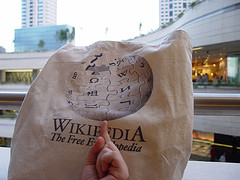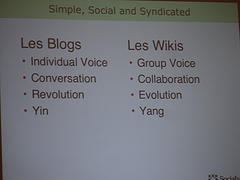A WIKI way of learning!
 Hello everybody!
Hello everybody!
This week I explored the world of Wikis!
First of all, I asked myself the question:"What is a wiki"?
What is a wiki?
Reading and listening to the online video course by the Uni of Wisconsins I understood that a wiki is a web page that can be viewed and modified by anybody with a Web browser and access to the Internet.Any visitor can change and add the content of a wiki if they want. This means that wikis are:
-extremely collaborative and open-ended sites
-a tool for collaboration
-a discussion medium
-an important repository which can also incorporate sounds and pictures
Wiki Wiki Web
I also enjoyed to discover something about the origin of this term,which sounds like a sort of magic word.
The word Wiki is not an acronym but an Hawaijan word used as an alliterative substitute for quick, to avoid naming this social software quick-web. Ward Cunningham was the first person who named it.
The features of Wikis.
The audience of these collaborative websites is very wide and diversified:everyone can take advantage of wikis.
Usually their layout is simple and clear: sentences are quite short and parataxis is prevailing.
Moreover, I noticed that all the wikis I visited (Wikipedia, Wikibooks...) are available in different languages and full of hyperlinks: users can simply click on what they are interested in.
Generally speaking, I think that wikis are quite similar to a blog in structure and logic. However, in contrast, a blog is typically authored by an individual and does not allow visitors to change the original posted materials, only add comments to the original comment.
On the contrary a wiki allows anyone to edit, delete or modify content that has been placed on the website.
On Flickr I found this picture
It compares Blogs and Wikis.
I believe it is significant.What do you think?
During my trip on Wikisphere Ialso noticed that there are different Wiki communities on line. Some are public and useful for everyone, others are highly specialised (used for business and economic purposes for example) and very often they are private.
Here there are some wikis I found interesting for everyone:
-Wikipedia:the free encyclopedia that anyone can edit.
-Wikibooks:a sort of collection of free content textbooks.
-Wikiquote:a free online compendium of quotations from notable people and creative works in every language, including sources ,translations of non-English quotes, and links to Wikipedia for further information.
-Wikiversity: is a community for the creation and use of free learning materials and activities. It is a multidimensional social organization dedicated to learning, teaching, research and service.
-Wikinews:A free news source you can write!
The disadvantages of Wikis
Besides many advantages, this tool for collaborative authoring can also have some negative aspects. The fact that anyone is allowed to edit and delate content is a double-edged weapon. In fact, online vandalism threatens the software security: some editors of wikis might not have good intentions and others can be trolls.
According to Wikipedia, in Internet terminology, trolls are people who enter on established community and intentionally try to cause disruption; most often in the form of posting off-topic and insulting messages.
For this reason, wikis are often monitored to ensure that inappropriate language, spam and bad content are not allowed.
Furthermore, on the Web you can find a Wikiquette (it comes from wiki+etiquette).This refers to rules to follow to behave appropriately in order to become a good and responsible editor of Wikis.The basic rule is to have respect for the work of the other publishers.This means ,above all, that you have to be careful of the words you choose, trying to be never rude and ambiguous.And..what is important: avoid reverts and deletions whenever possible!
Why Wikis?
 Thanks to Wiki-technology, everyone can become a publisher.Wikis address a variety of pedagogical needs and students can access and partecipate from every part of the world! These collaborative projects are a powerful tool for collection of data and reflection.
Thanks to Wiki-technology, everyone can become a publisher.Wikis address a variety of pedagogical needs and students can access and partecipate from every part of the world! These collaborative projects are a powerful tool for collection of data and reflection.
Anyway, just think about the importance of a source like Wikipedia, a multilingual encyclopedia written by volunteers,and you'll immediately understand the utility of Wikis!
Bye
Annalisa
Photo sources:
http://www.flickr.com/photos/rsepulveda/10834201/







